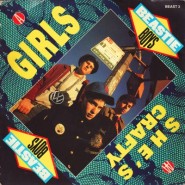Why Is GoldieBlox’s Use of Beastie Boys Song Not Fair Use?
 Well, I think it’s pretty clear.
Well, I think it’s pretty clear.
My good friend, Nate Harrison, penned some good arguments a couple of weeks ago, here and here, as to why GoldieBlox’s use of the Beastie Boys’ “Girls” song is fair use. Nate focuses on the parody argument, arguing that the Campbell case established this as fair use.
That’s true, Campbell did establish that, but it left two key questions open. One, they remanded the case back to the trial court in order for the trial court to assess whether Two Live Crew had appropriated too much of Roy Orbison’s song. The case was settled, so we don’t have an answer to this first question. Two, the Supreme Court did not address whether parody, regardless of use or intent, is always fair use. This is the key question regarding the GoldieBlox v. Beastie Boys dilemma.
What does question #2 mean? It means that it would be a bit absurd to assume that the use of any copyrighted song by another party — under the alleged rubric of parody — to sell a product, where the product is not the original copyright song, is always fair use.
Think about the absurdity of this. This would mean that all a commercial appropriator would have to do is make a slight twist to the lyrics and/or music of the original and claim that it was a parody of it, and so, under the guise of “we’re making a commentary/critique on the original song, they get to use it, without permission or financial compensation to the copyright owner, to sell their product.” This would basically mean that GoldieBlox could hire Weird Al Yankovic to “rework” a copyrighted song for the purposes of promoting a commercial product. In fact, wouldn’t this also mean that Weird Al could simply license out his version of a so-called “parody”? That would be one absurd outcome: the owner of the song would be left empty handed while Weird Al would be allowed to profit from his parody of a copyrighted song. Huh?
I know no one likes to talk about artistic intent anymore because somehow we’ve all become appropriating automatons, but the problem is, as you may have gathered, that GoldieBlox alleges, incorrectly, that their appropriation of the Beastie Boys song was to critique the song’s alleged “sexism” (I say “alleged” because I’m not convinced the Boys wrote their lyrics in earnest), and that their use of the “parodic” version to sell a product was incidental. I don’t think so. Nope, this is some very smart lawyering; the kind that only deep pockets can buy. So, the answer to the headline question is, because the alleged parody is being used to sell a commercial product, for profit, and not intended to solely critique the song, “Girls.”
Interviewed by Salon, musician and frontman David Lowery agrees,
A parody has to be about the song — like, say, if you’re parodying a song, then the parody is about the song — that’s the sole point of it. Not to sell a commercial product for a for-profit company. So you don’t take a parody of a song and sell Shell Oil, or you don’t parody a song to, for instance, advocate some position that maybe the Koch brothers want to advocate or that George Soros wants to advocate. It has to be specific. The parody has to be about the song.This is a commercial use of a song to sell a product, which — like I said — even the Pirate Party, with their limited view of copyright, that is where they say copyright comes into effect.
If you’re still here and not bored to tears by this debate, there’s this good overview regarding the above by Lori Werderitch, where she distinguishes satire from parody, indicating, it seems to me, that GoldieBlox’s use was more satire than parody, and thus making their fair use argument much more difficult.
And finally, here’s The Economist’s version, and a groovy remix via Fisher & Fiebak.
Tags: art, Beastie Boys, commercial use, Copyright, gender, GoldieBlox, law, music, not fair use, toys



Isn’t it possible that parody and product selling aren’t mutually exclusive? Might GoldieBlox being doing both? You raise a good point–this is not de facto parody and thus fair use. For me the conundrum comes with weighing how much of the expression is a critique of the song itself (I think it is), how much is a critique of sexism in general (GB wants to promote a pro-girl-science position, over and above anything to do with the BB), and how much those two things factor in selling. Several courts have made clear that nearly all forms of expression listed under fair use (news reporting, commentary, etc.) are made for profit, so again I think the sticking point would be how much doe the product commercialism weigh against the song’s parody…
Yes, I agree. This would have made a great test case, but given how much courts seem to be screwing up fair use cases it’s probably for the best it settled. I think this situation hinges on whether or not a parody, regardless of how it’s used, is fair use. To me, if parody was always fair use regardless of intent or referent, would gut copyright quite a bit. And as you know, I think copyright law as is works quite well. Great case!